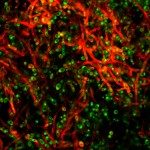Présentation
Following our introduction of Multi-Locus Sequence Typing (MLST) as the state-of-the-art methodology for molecular epidemiology studies of C. albicans, the Fungal Biology and Pathogenicity Unit at Institut Pasteur is now progressing into population genomics studies of C. albicans. Knowledge gained by MLST and genome sequencing inform us on the mechanisms used to generate diversity within the C. albicanspopulation and paves the way to identifying the genetic determinants that underlie phenotypic diversity across C. albicans isolates. We have recently generated genome sequences for 150 C. albicans strains which we previously isolated from diverse sources.Our genomic analyses have confirmed a predominantly clonal mode of reproduction in the sampled C. albicans population and emphasized the importance of loss-of-heterozygosity (LOH) as a driver of genomic diversity among these isolates. LOH events also play important roles in the acquisition of antifungal resistance by C. albicans. We are investigating the molecular mechanisms that control LOH and have shown that the Rad53 and Dun1 protein kinases of the DNA damage checkpoint are required to maintain heterozygosity. Furthermore, we have established a novel fluorescence-based reporter system to facilitate the identification of C. albicans genes with previously unknown roles in the control of LOH events. Our ongoing research will continue to pursue the characterization of the molecular mechanisms controlling genome stability in C. albicans.Our access to genome sequences for phenotypically diverse C. albicans isolates will also allow us to develop genotype-to-phenotype association studies in this species.










